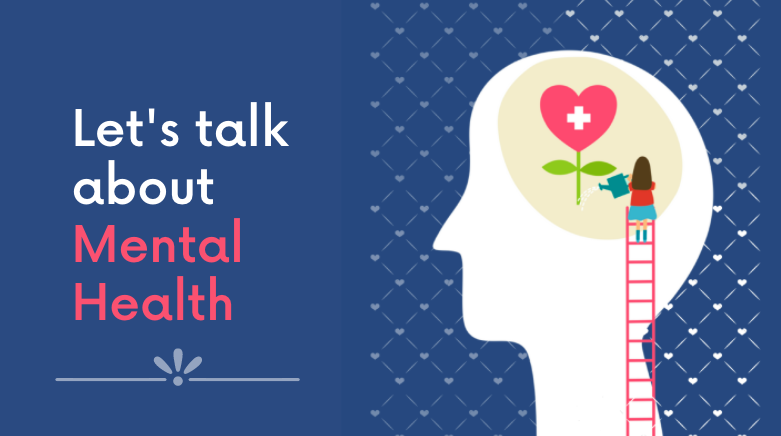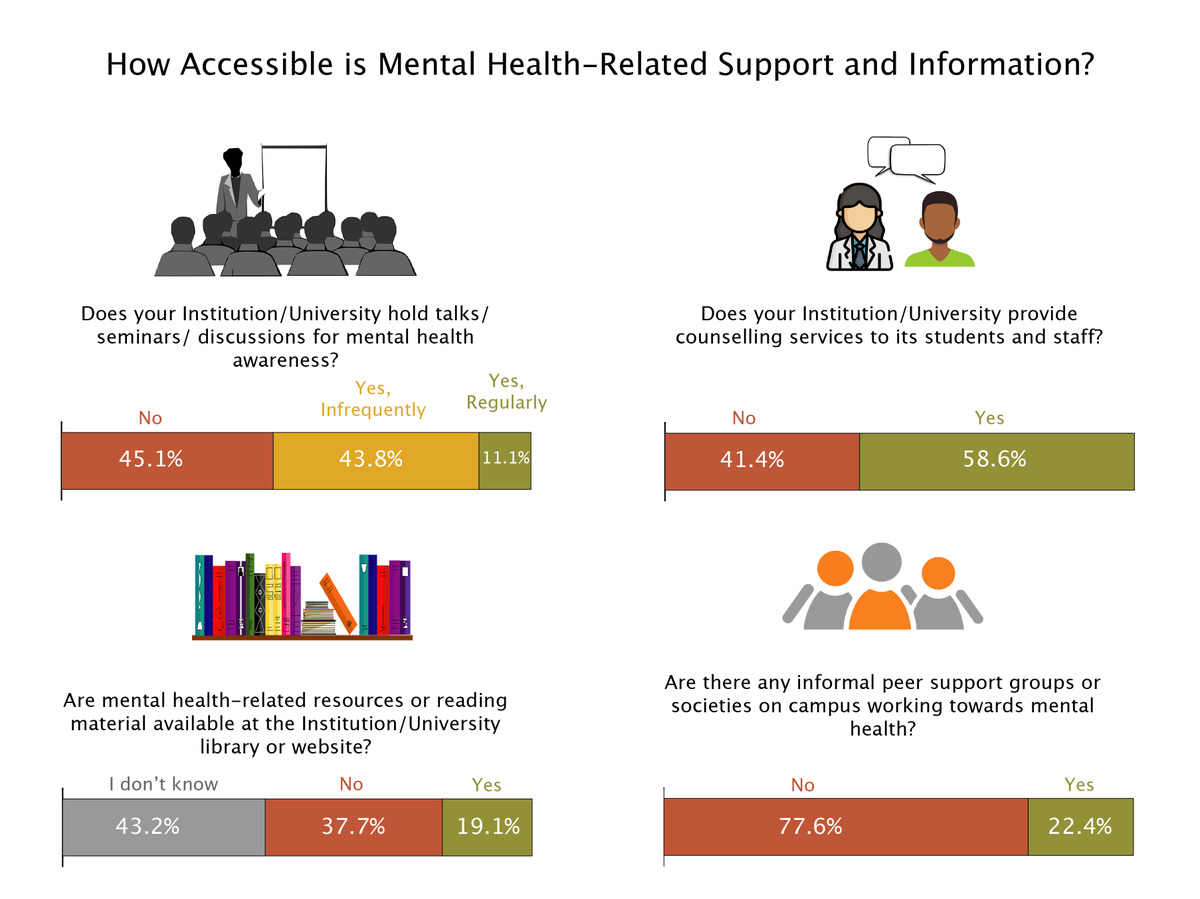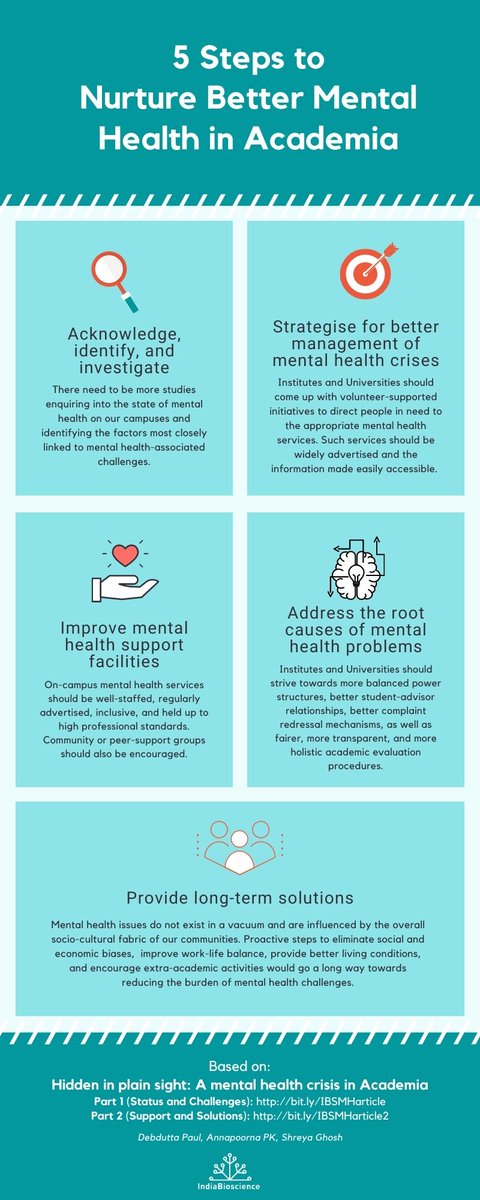A little over a year ago, we launched a survey to understand the status of #mentalhealth  https://abs.twimg.com/hashflags... draggable="false" alt=""> related awareness and support in Indian research institutes and universities. Over 800 researchers and students responded. Here are some of our key findings.
https://abs.twimg.com/hashflags... draggable="false" alt=""> related awareness and support in Indian research institutes and universities. Over 800 researchers and students responded. Here are some of our key findings.
/thread (1/n)
/thread (1/n)
59% of survey respondents admitted to having faced mental health-related issues during their academic career, 82% of whom were never officially diagnosed. Only 18% amongst these said that they received help through counselling/therapy services available in their institution (2/n)
38% of those who faced mental health challenges couldn& #39;t speak with anyone about their issues. Of those who did open up, over a quarter stated that the majority of the people they spoke to were not supportive (3/n)
Only 58% of the respondents agreed that their institute/uni provided mental health-related support. 43% said they didn& #39;t know whom to contact in case of a mental health crisis. Overall, 68% did not find the mental health support services at their institutes adequate (4/n)
Only 11% of the respondents said that their institute/university held regular talks or seminars for mental health awareness. Just 19% of respondents reported that their institute’s library or website had any reading material related to mental health. (5/n)
Our follow-up interviews also pointed towards a general lack of awareness about mental health and a normalisation of mental health issues, with poor mental health and unhealthy levels of workplace stress often being accepted as the norm. (6/n)
Some of the main factors repeatedly associated with mental health challenges were - skewed academic hierarchies and power structures, strained student-advisor relationships, inhumane work hours, lack of work-life balance, and the ‘publish or perish’ culture (7/n)
Other factors included unhealthy levels of competition and peer pressure, poor remuneration, lack of job security, lack of exposure to future non-academic job prospects, as well as social hierarchies of caste and gender (8/n)
The survey received responses from PhDs, postdocs, undergrads, postgrads, faculty, & JRFs/staff from over 200 Indian institutes. We acknowledge this isn& #39;t a fully representative sample & the responses reflect the participants& #39; worldviews, adding a measure of subjectivity (9/n)
Even so, these numbers point towards a burgeoning issue whose scale has not been appreciated adequately and a pressing challenge that would require the concerted efforts at the individual, institutional, and policy level to solve (10/n)
We compiled a detailed list of recommendations drawn from crowdsourced suggestions collected from both the survey and interviews, that may be adopted and applied by academic institutions at all levels (11/n)
Some of the key steps would be to acknowledge there is a problem and investigate it systematically, create better crisis-management systems, improve mental health support facilities, address root causes of such issues, and think long-term when it comes to solutions (12/n)
On #WorldMentalHealth day, we urge you to continue this conversation. This study was the result of a year-long collaborative effort between @dbdttpl, @hippo_campy, and @Shreya_SciLens. Please read the full report and recommendations here: https://indiabioscience.org/columns/indian-scenario/hidden-in-plain-sight-a-mental-health-crisis-in-academia">https://indiabioscience.org/columns/i... (13/n)
And here is part 2 (n/n) https://indiabioscience.org/columns/indian-scenario/hidden-in-plain-sight-a-mental-health-crisis-in-academia-part-2">https://indiabioscience.org/columns/i...

 Read on Twitter
Read on Twitter related awareness and support in Indian research institutes and universities. Over 800 researchers and students responded. Here are some of our key findings. /thread (1/n)" title="A little over a year ago, we launched a survey to understand the status of #mentalhealth https://abs.twimg.com/hashflags... draggable="false" alt=""> related awareness and support in Indian research institutes and universities. Over 800 researchers and students responded. Here are some of our key findings. /thread (1/n)" class="img-responsive" style="max-width:100%;"/>
related awareness and support in Indian research institutes and universities. Over 800 researchers and students responded. Here are some of our key findings. /thread (1/n)" title="A little over a year ago, we launched a survey to understand the status of #mentalhealth https://abs.twimg.com/hashflags... draggable="false" alt=""> related awareness and support in Indian research institutes and universities. Over 800 researchers and students responded. Here are some of our key findings. /thread (1/n)" class="img-responsive" style="max-width:100%;"/>




